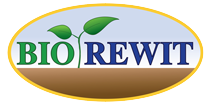Project title and acronym: New soil improvement products for reducing the pollution of soils and waters and revitalizing the soil system „BIOREWIT”
Excessive
development of agricultural production mostly connected with the use of mineral
fertilizers and synthetic pesticides caused in many areas a lot of threats in soil quality and its
biological activity. Because of that all over the world soil productivity and
fertility is now decreasing. Generally natural fertility decrease is estimated
at 2.5% a year but with agricultural use
it follows thousand times faster.
Intensive glasshouse production is mainly located on
small areas so in Poland as in all Europe, what is a pollution risk of soil,
ground water, environment and danger to health of people and animals. Soilless
cultivation methods are commonly use in glasshouse production based on the
rockwool mate as a growing medium. It is not biodegradable substrate what makes
a problem with its decomposition and is not environmentally friendly. To avoid unfavorable
influence of agricultural activity on the environment project"New soil improvement products for reducing the
pollution of soils and waters and revitalizing the soil system - BIOREWIT” was prepared, realized in Research
Institute of Horticulture in Skierniewice and Institute for Sustainable
Technologies in Lodz within the confines of LIFE10 ENV/PL/661 Programme. The
project is financed by EU Commission and National Fund for Environmental
Protection and Water Management.
PROJECT LOCATION: Skierniewice, Poland
BUDGET INFO :
Total amount: 1 853 195,00 EUR
% EU Co-funding: 50%
% NFOŚiGW Co-funding 45%
DURATION: Start: 01/01/2012 - End: 31/12/2014
PROJECT’S IMPLEMENTORS:
Coordinating Beneficiary: Research Institute of Horticulture
Associated Beneficiary: Institute for Sustainable Technologies
BACKGROUND and AIMS:
Agriculture is one of the main sources of environmental pollution. The aim of the project is to reduce soil and water pollution and revitalizing soil ecosystem by:
- Utilization of natural fibrous wastes for producing biodegradable soilless substrates to reduce cultivation of greenhouse crops on non biodegradable rockwool.
- Reduction of mineral nutrient emission from drain water of greenhouse soilless culture by utilizing drain water
- Reduction of the pollution of soil and water through replacement of mineral fertilizers by eco-activators and enrichment of soil in the organic matter.
MAIN EU POLICY(IES) TARGETED:
- Soil protection –Soil Thematic Strategy
- Water protection - Council Directive 91/676/EEC
- Reduction of non biodegradable wastes and limitation necessity of landfill use for waste storage
- Directive 99/31/EC
MAIN ACTIVITIES:
The innovative aspects of the actions include:
- Implementation of new biodegradable soilless substrates based on natural fibrous wastes for greenhouse cultivation
- Implementation of new eco-activators received trough impregnation of natural wastes with drainage water from greenhouse soilless cultivation
- Implementation of: 1) new eco-activators made from processed legume plants and 2) new biodegradable fleece produced from natural organic wastes and legume plants
EXPECTED RESULTS:
- Reduction of the pollution of water and soil trough replacement of mineral fertilizers by new soil eco-activators
- Elimination of nutrient emission from drain water of greenhouse open soilless culture to the ground and surface water
- Enrichment of soil in organic matter trough application of eco-activators and organic fertilizers made from organic wastes
- Reduction of non biodegradable wastes from soilless greenhouse production
- Improvement of quality of horticultural products.







